(完整版)最新外研版小学六年级英语下册知识点归纳复习
六年级外研社下册知识点

六年级外研社下册知识点下面将介绍六年级外研社下册的主要知识点。
本册内容丰富多样,包括英语语法、词汇、阅读理解和写作等方面的知识。
通过学习这些知识点,学生将能够提高英语能力,更好地应对各类考试和实际应用情境。
一、语法知识点1. 一般现在时:介绍这一时态的基本构成和用法,包括肯定句、否定句和疑问句的形式及其回答。
2. 一般过去时:学习这一时态的构成和用法,讲述过去发生的动作或状态。
3. 现在进行时:阐述进行时的构成和用法,用于描述正在进行的动作。
4. 现在完成时:介绍完成时的构成和用法,表示过去经历的动作对现在造成的影响。
5. 一般将来时:学习将来时的构成和用法,表示将来发生的动作或状态。
6. 时态综合练习:通过综合练习,巩固和运用所学的各个时态。
二、词汇知识点1. 名词复数形式:介绍名词复数的构成规则,让学生掌握常见名词复数形式的变化规律。
2. 动词的变化形式:包括动词的原形、过去式和现在分词形式,通过练习加深学生对动词变化形式的理解。
3. 介词的用法:介绍常见的介词及其在句子中的用法和搭配。
4. 短语和固定搭配:学习一些常见的短语和固定搭配,并通过练习进一步掌握其应用。
三、阅读理解1. 短文阅读:提供一系列短文,要求学生根据短文内容回答问题,培养学生的阅读理解能力。
2. 阅读理解练习:通过不同形式的阅读理解练习,巩固学生的阅读技巧和理解能力。
四、写作1. 书面表达:介绍书面表达的基本要素和写作技巧,培养学生的写作能力。
2. 日记写作:引导学生写作日记,让他们能从自身经历中进行思考和表达。
3. 作文写作:指导学生根据所学知识和自己的观点进行作文写作,锻炼他们的逻辑思维和表达能力。
通过六年级外研社下册的学习,学生将掌握一系列语法知识,丰富词汇量,提高阅读理解和写作水平。
同时,这些知识点也为学生的英语学习打下坚实的基础,为今后更深入的学习奠定了良好的基础。
希望同学们能够认真学习,积极练习,取得好成绩。
外研版小学英语六年级下学期下册知识点归纳

外研版小学英语六年级下学期下册知识点归纳外研版小学英语六年级下学期下册知识点第一模块一、单元词汇look看上去cashier收银员cola可乐dollar美元cent美分enjoy 享用,享受careful小心的Be careful!当心!二、重点句型(点餐)1. A: Can I help you?B: I want a hot dog, please.2. A: And to drink?B: I want a cola./Three colas, please.3. A: How much is it?B: It’s thirteen dollars and twenty-five cents.A: Here you are.B: Thank you. Enjoy your meal!4. A: What do you want to eat / drink?B: I want noodles and a cola. /Milk, please.第二模块一、单元词汇later后来,以后to go剩余duck鸭子pond水池,池塘cloud 云dry干的like像......一样look like看来好像stay保持,维持二、重点句型1. A: When are we going to eat?B: At half past twelve.2. Look at the ducks! They’re eating our sandwiches!3. 明天的天气将会......It will be + 天气(形容词)+ in + 城市(名词).It will + 天气(名词)+ in + 城市(名词).It will be sunny in Harbin.It will rain in Beijing.第三模块一、单元词汇shine(太阳)发光,照耀cry哭everyone人人,每人;大家fly away 飞走just就,且请cow奶牛blow吹,刮rabbit兔子二、重点句型正在做某事:主语+ am/is/are + v.-ing + 其他.1. The sun is shining.2. The birds are singing in the tree.3. A:What are you doing?B: I’m cleaning my room.三、语法知识现在分词的变化规则1、一般动词直接在词尾加-ing: read→reading(读) talk→talking(交谈)2、以不发音的e结尾的动词,先去e再加-ing: write→writing (写)3、以重读闭音节结尾且末尾只有一个辅音字母的动词,双写这个辅音字母再加-ing:swim→ swimming(坐)run→ ru nning(跑)4、少数几个以ie结尾的动词,变ie为y,再加-ing: lie→ lying (躺,口诀记忆:动词-ing很好记,一般情况直接加。
外研版六下英语知识点总结

外研版六下英语知识点总结六年级英语下册单词与短语复习Module1~Module6一、英语互译。
1.how much 多少钱2.Here you are!给你3.Enjoy your meal! 用餐愉快!4.Be careful 当心5..lots of 许多6.play with 和……一起玩7.get up 起床8.have breakfast 吃早餐9.have lunch 吃午餐10.have a picnic 去野餐11.in the park 在公园12.on the pond 在池塘里13.in the sky 在天空中14.have our picnic 吃我们的野餐15.over there 在那边16.look at 看17.go to the park 去公园18.go to school 去上学19.play football踢足球20.that’s right. 那是正确的21.after dinner 晚餐后22.play chess 下国际象棋23.go to bed 去睡觉24.have a good night 睡得好25.weather report 天气预报26.读书read a book 27.at home 在家28.in China 在中国29.write to 给……写信30.in this photo 在这张照片里31.in the tree 在树上32.fly away 飞走33.clean my room 打扫我的房间34.play hide-and-seek玩捉迷藏35.have a lovely time 过得很愉快36.on the train在火车上37.look out of 向外看38.under the/a tree 在树下39.in the water 在水里40.on the sea 在大海上41.the middle of the night 午夜42.flya kite 放风筝43.at the supermarket 44.have a birthday party 举办生日聚会45.on the phone 打电话46.happy birthday 生日快乐47.what a mess! 真是一团糟!48.try to设法49.get on the bus 上公共汽车50.get off the bus下公共汽车51.drive the bus 开公共汽车52.sit down 坐下53.stand up 起立54.play the suona 吹唢呐55.have a party举办聚会/doc/942877422.html,e in 进来57.cross the street横穿马路8.eat dinner 吃晚餐59. talk to 和……交谈60.do my homework 做我的家庭作业61.ride a bike 骑自行车62.do exercise 做体操63.watch TV 看电视64.a lot of 许多65.on the earth 在地球上66.space travel 太空旅行67.be interested in对……感兴趣68.in the book在书里69.make a paper spaceship做纸飞船70.bring back 带回71.make a model 制作模型;做榜样72.in a spaceship 在宇宙飞船73.in the basket 在篮子里74.on the bike 在自行车上75.the third time第三次76.wave to say goodbye挥手告别;挥手说再见;77.birthday present 生日礼物78.the national flag of China 中国国旗二、按要求写出下列单词的相应形式。
六年级下册英语外研版知识点总结

六年级下册英语知识点总结Module1一、词汇hot dog 热狗 cashier 收银员cola 可乐;一杯可乐 soup 汤dollar 美元 cent 美分enjoy 享用,享受meal 餐二、句子1. I want a hamburger. 我想要一个汉堡。
2. Can I have some soup? 我可以要一些粥吗?3. — How much is it? 多少钱?—It’s thirteen dollars and twenty-five cents. 一共是13美元,25美分。
5. Here’s your food. 这是你的食物。
6. Can I help you? 我可以帮你吗?7. — What do you want to drink? 你想喝什么?— Milk, please. 请来一杯牛奶。
三、句型结构1. I want + a/ an/ some... + 名词. 表示某人想要某物。
例: I want some eggs. 我想要一些鸡蛋。
2. What do you want to eat/ drink? 询问对方想吃/ 喝什么。
例: — What do you want to drink? 你想喝点什么?— A cup of coffee, please. 请来一杯咖啡。
Module2一、词汇later 后来,以后 dark 黑色的;黑暗的cloud 云 dry 干的stay 保持,维持 cloudy 多云的二、句子1.It’s only half past eleven. One hour to go. 现在才十一点半,还有一个小时。
2. There are some dark clouds in the sky. 天上有些乌云。
3. It’s going to rain soon. 马上要下雨了。
4. I don’t think so. 我不这样认为。
. —What will the weather be like in Beijing? 北京的天气将会怎么样?—It will be sunny. 将会是晴天。
外研版英语六年级下册知识点总复习知识分享

外研版英语六年级下册知识点总复习六年级下册复习资料Module 1一、单词短语:hamburger 汉堡包cola 可乐juice 果汁dollar 美元cent 美分restaurant 餐厅menu 菜单cashier 收银员careful 小心的Be careful 小心点look 看上去enjoy 享受,享用二、句子句型:1.Can I help you? (店员)我能帮助你吗?2.Can you help me? (客人)你能帮助我吗?3.I (don’t) know. 我(不)知道。
4. Here you are .给你5. — How much is it?这个多少钱?(一般疑问句)—It’s 数字dollar(s)./ It’s 数字cent(s) 几美元/几美分6. — What do you want (to eat / drink) ? 你想要(吃点/喝点)什么?— I want +7.Enjoy your meal! 享受你的大餐吧!8.in all 一共,总共三、单词复习:chicken鸡肉 rice 米饭 drink 喝的,饮料 noodles 面条 meat 肉vegetable 蔬菜 tea 茶叶 hot dog 热狗 milk牛奶fish鱼,鱼肉Module 2 一、单词短语duck 鸭子pond 水池cloud 云picnic 野餐,野炊dry 干的dark 黑的,暗的naughty 调皮的;顽劣的stay 保持,维持later 后来,以后to go剩余like 想......一样look like 看起来好像have a picnic 去野餐,吃野餐Let’s + V 原型让我们......go to the park 去公园go to bed 去睡觉play chess 下象棋look at 看at + 点钟在几点钟二、句子句型:1.What time is it? 几点了?It’s整点: 数字o’clock (几点整)half past + 数字(几点半)2.going to rain/snow/be windy/······将要下雨/下雪/刮风be going to (will) + do/ + be 形容词三、单词复习:breakfast 早餐 lunch 午餐 dinner 晚餐 hungry饥饿的 sandwich 三明治 weather 天气 sunny阳光灿烂的 cloudy 多云的;阴天的 snow雪;下雪 rain雨;下雨windy多风的 cold 冷的 warm 温暖的 hot热的 cool凉爽的Monday Thursday Wednesday Thursday Friday Saturday Sunday Weekend yesterday today tomorrow morning afternoon evening night tonightModule 3一、单词短语cow 奶牛rabbit 兔子supermarket 超市everyone 人人,每人;大家shine (太阳)发光,照耀blow 吹,刮cry 哭dance 跳舞fly 飞fly away 飞走sadly 伤心地strange 奇怪的middle 中间的wrong 错误的just 就,且请fly a kite 放风筝buy food 买吃的,买食物play football 踢足球lots of = a lot of 许多take photos 照相go home 回家in / on the tree 在树上be angry with 对····生气a funny day 有趣的一天in the sky 在空中二、句子句型:1.on + 星期在星期几2.Please write to me soon. 请尽快给我写信。
外研社英语六年级下册知识点汇总

外研社英语六年级下册知识点汇总外研社英语六年级下册知识点汇总六年级下册Module 1 知识汇总一、词汇hot dog 热狗cashier 收银员cola 可乐;一杯可乐soup 汤dollar 美元cent 美分enjoy 享用,享受meal 餐二、句子1. I want a hamburger. 我想要一个汉堡。
2.—What do you want? 你想要什么?—I want a hot dog. 我想要一个热狗。
3. Can I have some soup? 我可以要一些粥吗?4.—How much is it? 多少钱?—It’s thirteen dollars and twenty-five cents. 一共是13美元,25美分。
5. Here’s your food. 这是你的食物。
6.—What do you want to eat? 你想吃什么?—I want to eat some meat. 我想吃些肉。
7. Can I help you? 我可以帮你吗?8.—What do you want to drink? 你想喝什么?—Milk, please. 请来一杯牛奶。
三、句型结构1. I want + a/ an/ some... + 名词. 表示某人想要某物。
eg: I want some eggs. 我想要一些鸡蛋。
2. What do you want to eat/ drink? 询问对方想吃/ 喝什么。
eg: —What do you want to drink? 你想喝点什么?—A cup of coffee, please. 请来一杯咖啡。
3. —How much is ...? 询问某物多少钱。
—It’s ...eg: —How much is the coat? 这个外套多少钱?—It’s one hundred yuan. 一百元。
六年级下册Module 2 知识汇总eg: —Will it be rainy? 会是雨天吗?—No, it won’t. 不,不会的。
(完整)新版外研社英语六年级下册全册知识点及配套练习检测,推荐文档
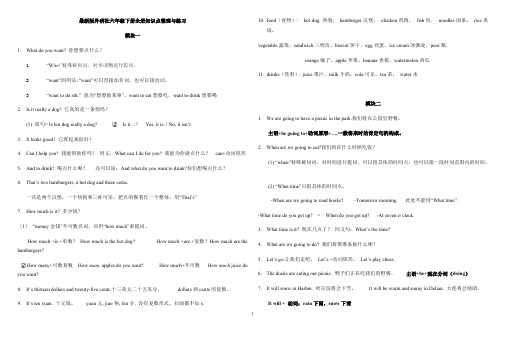
9. It’s ten yuan. 十元钱。 yuan 元, jiao 角, fen 分, 没有复数形式,后面都不加 s.
It will + 动词:rain 下雨,snow 下雪
1
It will + be+ 形容词:windy 有风的, cold 寒冷的, sunny 晴朗的, warm 暖和的, hot 炎热的,cool 凉爽的,cloudy 多云的。
模块二 1. We are going to have a picnic in the park.我们将在公园里野餐。
主语+be going to+动词原形+…,一般将来时的肯定句的构成。 2. When are we going to eat?我们将在什么时候吃饭?
(1) “when”特殊疑问词,对时间进行提问,可以指具体的时间点,也可以指一段时间范围内的时间。
(3) 还有双写末尾辅音字母的你能记住吗?
二.句型:
put –putting 放下 sit-sitting 坐下 shop-shopping 购物 swim-swimming 游泳
1. I had a very interesting day on Saturday.上个星期六我玩的很开心。
练习
【had 表示的是过去式。一般过去时态是表示过去某一时间经常发生的动作和存在的状态。常与 过去时间连用,如:yesterday, last year, an hour ago, just now 等等。动词要用其过去式。】
建议收藏下载本文,以便随时学习! 5. Look! It’s_____(going to rain\ raining) now.
7. We______ ( have ) a picnic in the park yesterday . 8. It ____________ (rain ) soon .
外研社六年级下册英语复习提纲_短语+句型
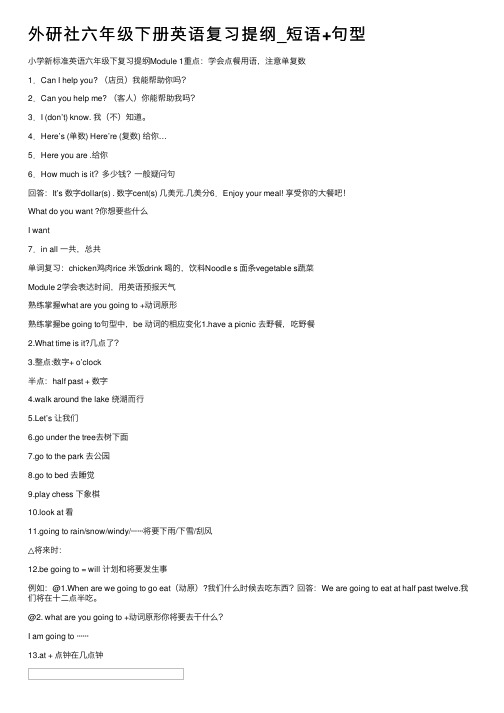
外研社六年级下册英语复习提纲_短语+句型⼩学新标准英语六年级下复习提纲Module 1重点:学会点餐⽤语,注意单复数1.Can I help you? (店员)我能帮助你吗?2.Can you help me? (客⼈)你能帮助我吗?3.I (don’t) know. 我(不)知道。
4.Here’s (单数) Here’re (复数) 给你…5.Here you are .给你6.How much is it?多少钱?⼀般疑问句回答:It’s 数字dollar(s) . 数字cent(s) ⼏美元.⼏美分6.Enjoy your meal! 享受你的⼤餐吧!What do you want ?你想要些什么I want7.in all ⼀共,总共单词复习:chicken鸡⾁rice ⽶饭drink 喝的,饮料Noodle s ⾯条vegetable s蔬菜Module 2学会表达时间,⽤英语预报天⽓熟练掌握what are you going to +动词原形熟练掌握be going to句型中,be 动词的相应变化1.have a picnic 去野餐,吃野餐2.What time is it?⼏点了?3.整点:数字+ o’clock半点:half past + 数字4.walk around the lake 绕湖⽽⾏5.Let’s 让我们6.go under the tree去树下⾯7.go to the park 去公园8.go to bed 去睡觉9.play chess 下象棋10.look at 看11.going to rain/snow/windy/······将要下⾬/下雪/刮风△将来时:12.be going to = will 计划和将要发⽣事例如:@1.When are we going to go eat(动原)?我们什么时候去吃东西?回答:We are going to eat at half past twelve.我们将在⼗⼆点半吃。
六年级下册英语外研版课堂笔记
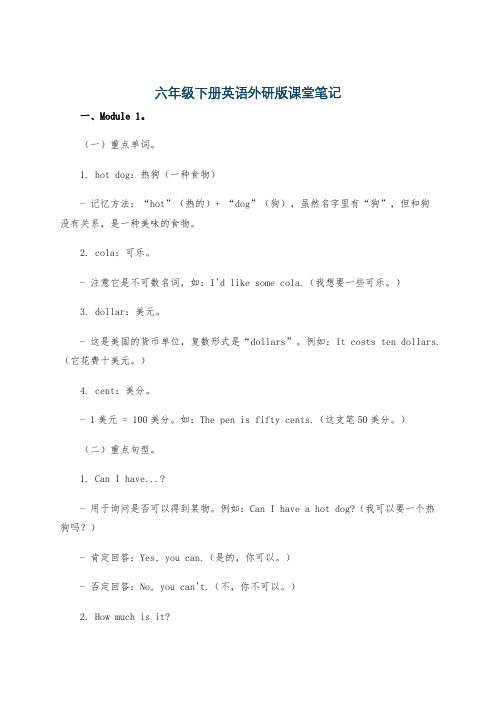
六年级下册英语外研版课堂笔记一、Module 1。
(一)重点单词。
1. hot dog:热狗(一种食物)- 记忆方法:“hot”(热的)+ “dog”(狗),虽然名字里有“狗”,但和狗没有关系,是一种美味的食物。
2. cola:可乐。
- 注意它是不可数名词,如:I'd like some cola.(我想要一些可乐。
)3. dollar:美元。
- 这是美国的货币单位,复数形式是“dollars”。
例如:It costs ten dollars.(它花费十美元。
)4. cent:美分。
- 1美元 = 100美分。
如:The pen is fifty cents.(这支笔50美分。
)(二)重点句型。
1. Can I have...?- 用于询问是否可以得到某物。
例如:Can I have a hot dog?(我可以要一个热狗吗?)- 肯定回答:Yes, you can.(是的,你可以。
)- 否定回答:No, you can't.(不,你不可以。
)2. How much is it?- 用来询问物品的价格。
例如:How much is the cola?(可乐多少钱?)- 回答:It's...(它是……),后面可以接具体的价格,如:It's three dollars.(它是三美元。
)二、Module 2。
(一)重点单词。
1. duck:鸭子。
- 复数形式是“ducks”。
可以说:There are some ducks in the pond.(池塘里有一些鸭子。
)2. noisy:吵闹的。
- 形容词,用来形容环境或声音很吵闹。
例如:The market is noisy.(市场很吵闹。
)3. peace:和平;太平。
- 例如:We all hope for world peace.(我们都希望世界和平。
)4. wide:宽的。
- 反义词是“narrow”(窄的)。
外研版小学六年级下册英语总复习
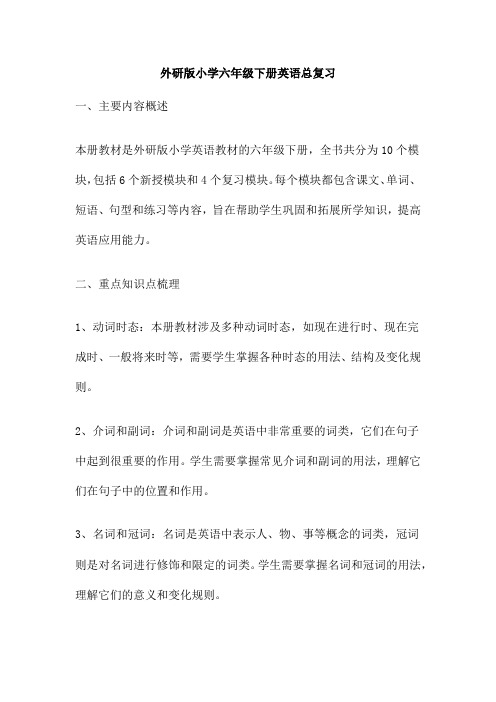
外研版小学六年级下册英语总复习一、主要内容概述本册教材是外研版小学英语教材的六年级下册,全书共分为10个模块,包括6个新授模块和4个复习模块。
每个模块都包含课文、单词、短语、句型和练习等内容,旨在帮助学生巩固和拓展所学知识,提高英语应用能力。
二、重点知识点梳理1、动词时态:本册教材涉及多种动词时态,如现在进行时、现在完成时、一般将来时等,需要学生掌握各种时态的用法、结构及变化规则。
2、介词和副词:介词和副词是英语中非常重要的词类,它们在句子中起到很重要的作用。
学生需要掌握常见介词和副词的用法,理解它们在句子中的位置和作用。
3、名词和冠词:名词是英语中表示人、物、事等概念的词类,冠词则是对名词进行修饰和限定的词类。
学生需要掌握名词和冠词的用法,理解它们的意义和变化规则。
4、句子结构:英语句子结构可以分为简单句、并列句和复合句等,学生需要掌握各种句子结构的构成和用法,理解它们在表达意思时的不同作用。
5、阅读理解:阅读理解是英语学习中非常重要的一项技能,学生需要提高阅读速度和理解能力,掌握阅读技巧和方法。
三、复习策略和建议1、系统复习:制定合理的复习计划,按照教材顺序进行系统复习。
注意把握重点和难点内容的复习时间和力度。
2、强化记忆:多读、多背、多记是提高英语成绩的有效途径。
学生可以通过朗读、背诵、记忆等方式加强记忆,提高词汇量和语法知识水平。
3、注重实践:英语是一门实践性很强的学科,学生需要多听、多说、多写。
通过模拟对话、写作练习等方式提高英语应用能力。
4、练习册:认真完成教材配套的练习册中的练习题,及时查漏补缺,巩固所学知识。
5、课外阅读:适当阅读课外英语读物,如英语故事书、英文报纸等,可以提高阅读兴趣和扩大词汇量。
6、做好笔记:在复习过程中做好笔记,记录重点内容、典型例题和自己的错题集锦,方便以后查阅和复习。
7、交流讨论:与同学、老师或家人交流讨论学习内容和方法,互相借鉴经验,提高学习效果。
四、模拟试题及答案解析(此处略去模拟试题及答案解析)五、结语小学六年级下册英语总复习是帮助学生巩固和拓展所学知识,提高英语应用能力的重要阶段。
外研版六年级英语下册知识点归纳

26个英文字母书写笔顺M1知识点1 .want:want to+V原:想要做... want+人/物:想要... want sb to do+V原:想要某人去做want to be+职业:想要成为...2.What do you want to eat? What do you want to drink?3.It look s good. It smell s/sound s/feel s/taste s/ touch es good.4. Can I help you? 同义句What can I do for you?5. A hamburger for me. And to drink?6. That’s two hamburgers, a hot dog and three colas. 总共是,整体That’s=that is总共是7 .How much is it?(询问价格)How many+可数复数+其它How much+不可数名词+其它?8. It’s thirteen dollar s and twenty-five cent s.9. I want a hot dog with lots of cheese. (with:加,放)Eg.I want noodles with lots of meat. 译:他想要加冰的可乐。
M1短语1.look good 2.how much 3.Here you are 4.Enjoy your meal 5.Be careful 6.Can I help you ? 7. What can I help you ?M2知识点时态:一般将来时结构:主语+will+动原... 主语+be going to+动原...1.It’s half past eleven. (11:30)2. Let’s have a picnic in the park. Let’s+动原:让我们做...3. When are we going to eat? when:什么时间--引导特殊疑问句4. What time is it? (几点了?) 同义句What’s the time?(询问时间) 答语:It’s+时间。
六年级下册英语-小学英语语法总复习知识点归纳 外研版(三起)
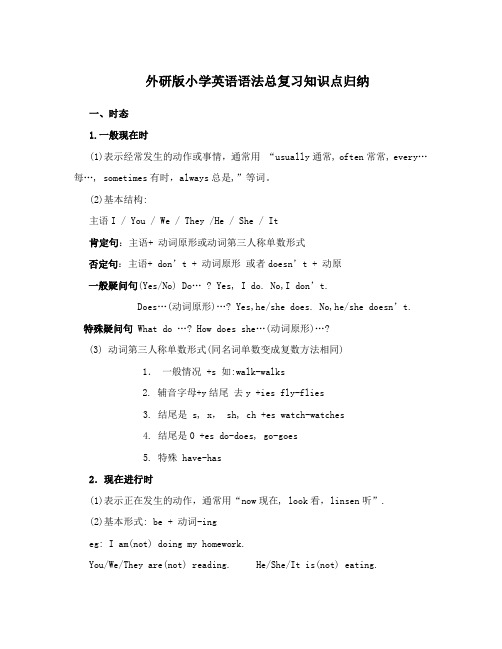
外研版小学英语语法总复习知识点归纳一、时态1.一般现在时(1)表示经常发生的动作或事情,通常用“usually通常, often常常, every…每…, sometimes有时,always总是,”等词。
(2)基本结构:主语I / You / We / They /He / She / It肯定句:主语+ 动词原形或动词第三人称单数形式否定句:主语+ don’t + 动词原形或者doesn’t + 动原一般疑问句(Yes/No) Do… ? Yes, I do. No,I don’t.Does…(动词原形)…? Yes,he/she does. No,he/she doesn’t.特殊疑问句What do …? How does she…(动词原形)…?(3) 动词第三人称单数形式(同名词单数变成复数方法相同)1.一般情况 +s 如:walk-walks2. 辅音字母+y结尾去y +ies fly-flies3. 结尾是 s, x, sh, ch +es watch-watches4. 结尾是0 +es do-does, go-goes5. 特殊 have-has2.现在进行时(1)表示正在发生的动作,通常用“now现在, look看,linsen听”.(2)基本形式: be + 动词-ingeg: I am(not) doing my homework.You/We/They are(not) reading. He/She/It is(not) eating.What are you doing? Is he reading?(3)动词的现在分词形式(动词+ing)一般情况 +ing walk—walking结尾是不发音的 e -e + ing come—coming 重读闭音节双写最后一个字母+ing swim-swimming run-running3. 一般过去时(1) 表示过去已经发生的事情,通常用“last …上一个…, just now刚才, many years ago许多年前, yesterday昨天”等词。
外研版六年级下册英语知识点梳理--句子精选全文完整版
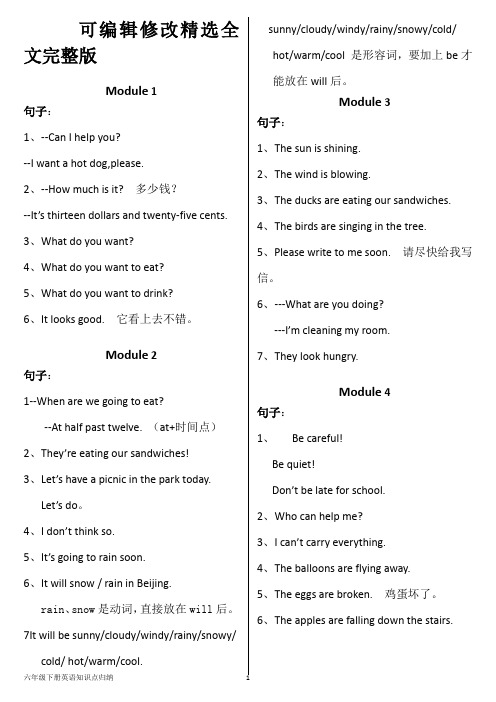
可编辑修改精选全文完整版Module 1句子:1、--Can I help you?--I want a hot dog,please.2、--How much is it? 多少钱?--It’s thirteen dollars and twenty-five cents.3、What do you want?4、What do you want to eat?5、What do you want to drink?6、It looks good. 它看上去不错。
Module 2句子:1--When are we going to eat?--At half past twelve. (at+时间点)2、They’re eating our sandwiches!3、Let’s have a picnic in the park today.Let’s do。
4、I don’t think so.5、It’s going to rain soon.6、It will snow / rain in Beijing.rain、snow是动词,直接放在will后。
7It will be sunny/cloudy/windy/rainy/snowy/ cold/ hot/warm/cool.sunny/cloudy/windy/rainy/snowy/cold/hot/warm/cool 是形容词,要加上be才能放在will后。
Module 3句子:1、The sun is shining.2、The wind is blowing.3、The ducks are eating our sandwiches.4、The birds are singing in the tree.5、Please write to me soon. 请尽快给我写信。
6、---What are you doing?---I’m cleaning my room.7、They look hungry.Module 4句子:1、Be careful!Be quiet!Don’t be late for school.2、Who can help me?3、I can’t carry everything.4、The balloons are flying away.5、The eggs are broken. 鸡蛋坏了。
(完整word版)外研版六年级下册知识点,
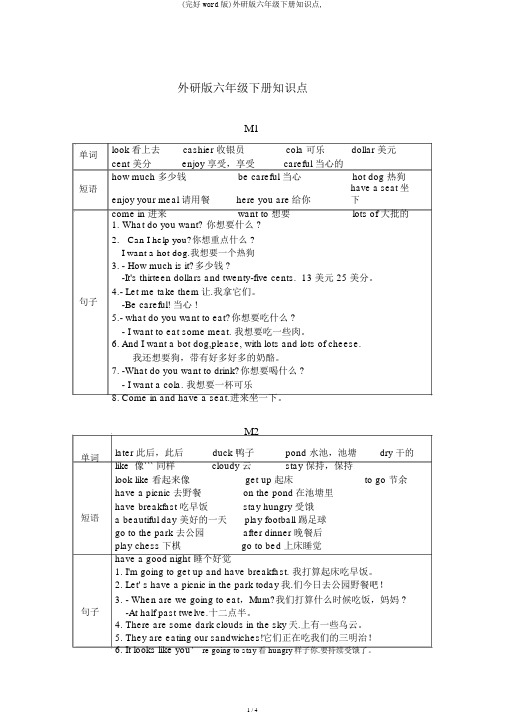
外研版六年级下册知识点单词短语句子M1look 看上去cashier 收银员cola 可乐dollar 美元cent 美分enjoy 享受,享受careful 当心的how much 多少钱be careful 当心hot dog 热狗enjoy your meal 请用餐here you are给你have a seat坐下come in 进来want to 想要lots of 大批的1.What do you want? 你想要什么 ?2.- Can I help you?你想重点什么 ? -I want a hot dog.我想要一个热狗3.- How much is it?多少钱 ?-It's thirteen dollars and twenty-five cents. 13 美元 25 美分。
4.- Let me take them让.我拿它们。
-Be careful! 当心 !5.- what do you want to eat?你想要吃什么 ?-I want to eat some meat. 我想要吃一些肉。
6.And I want a bot dog,please, with lots and lots of cheese.我还想要狗,带有好多好多的奶酪。
7.-What do you want to drink?你想要喝什么 ?-I want a cola. 我想要一杯可乐e in and have a seat.进来坐一下。
单词短语句子M2later 此后,此后duck 鸭子pond 水池,池塘dry 干的like 像``` 同样cloudy 云stay 保持,保持look like 看起来像get up 起床to go 节余have a picnic 去野餐on the pond在池塘里have breakfast吃早饭stay hungry 受饿a beautiful day 美好的一天play football 踢足球go to the park 去公园after dinner 晚餐后play chess下棋go to bed 上床睡觉have a good night 睡个好觉1.I'm going to get up and have breakfast. 我打算起床吃早饭。
六年级下册英语外研版知识点(一)

六年级下册英语外研版知识点(一)六年级下册英语外研版知识点详解Unit 1 Friendship•Vocabulary–Words related to characteristics: kind, helpful, understanding, patient, brave, and loyal.–Words related to emotions: happy, sad, excited, worried, surprised, and angry.•Grammar–Present continuous tense: used to talk aboutactions happening at the moment of speaking.•Form: am/is/are + verb-ing•Example: He is playing basketball.–Comparative and superlative adjectives: used to compare the characteristics of two or more things.•Comparative form: adjective + -er (, taller),more + adjective (, more beautiful)•Superlative form: the + adjective + -est (,the tallest), the + most + adjective (, themost beautiful)•Example: This book is more interesting thanthat one.–Modal verbs: used to express ability, permission, possibility, and necessity.•Can: used for ability or permission•Could: used for polite requests•Example: Can you help me with my homework? •Listening–Listening for specific information: understanding details related to the topic and answeringquestions based on the conversation.Unit 2 Nature•Vocabulary–Words related to nature and the environment: forest, river, lake, mountain, ocean, pollution, recycling,and conservation.–Words related to weather: sunny, cloudy, rainy, stormy, and windy.•Grammar–Simple present tense: used to talk about habits, general truths, and permanent situations.•Form: subject + verb (infinitive form)•Example: She always brushes her teeth beforebed.–Possessive pronouns: used to show ownership or possession.•Example: This is my book. That one is yours. •Reading–Reading comprehension: understanding a passage about nature and answering questions based on thetext.Unit 3 Sports•Vocabulary–Words related to sports: basketball, football, volleyball, tennis, swimming, running, cycling, andgymnastics.–Words related to sports equipment: ball, net,racket, helmet, swimwear, and sneakers.•Grammar–Simple past tense: used to talk about actions that happened in the past.•Form: verb + -ed (regular verbs), irregularverb forms (, went, saw)•Example: I played basketball yesterday. •Writing–Writing a paragraph about a favorite sport orphysical activity, including details about why youlike it and how often you do it.Unit 4 Culture•Vocabulary–Words related to cultural aspects: tradition,festival, costume, food, music, dance, andcelebration.–Words related to different countries: China, France, Brazil, India, and Australia.•Grammar–Modal verbs for polite requests and suggestions: used to make polite requests or suggestions.•Would: used for polite requests•Should: used for suggestions•Example: Would you please help me with this?Should we try this restaurant?•Speaking–Talking about different cultural traditions and festivals, including describing their significanceand how they are celebrated.Unit 5 Jobs•Vocabulary–Words related to jobs and occupations: doctor, teacher, chef, police officer, firefighter,scientist, artist, and engineer.–Words related to work activities: study, teach, cook, paint, protect, experiment, and build. •Grammar–Simple future tense: used to talk about future actions or plans.•Form: will + verb (infinitive form)•Example: I will become a doctor when I grow up. •Listening–Listening for general understanding: understanding the main idea or general information about jobs andoccupations.Unit 6 Planet Earth•Vocabulary–Words related to the Earth and the environment: continent, country, city, village, desert, forest,mountain, and river.–Words related to directions: north, south, east, and west.•Grammar–Prepositions of place and direction: used to show the position of something or the direction ofmovement.•Examples: in, on, at, to, from, into, out of,etc.•Reading–Reading a passage about different places on Earth and identifying information about theirgeographical features.以上就是六年级下册英语外研版相关知识点的详细整理。
(完整版)外研版六年级下册英语知识点梳理

3、对不可数名词数量提问,用“ how much+ 不可数名词 +其他?”
eg.How much milk do you want?
一、单词短语:
Module 2
duck鸭子 pond水池 cloud云 picnic野餐,野炊 dry干的 dark黑的,暗的 naughty调皮的;顽劣的 stay保持,维持 later后来,以后 to go 剩余 like像......一样 look like看起来好像 have a picnic去 野餐,吃野餐 walk around the lake绕湖而行 go under the tree 去树下面
③辅音字母 +y 结尾的,变 y 为 i,再加 -es. eg.party -parties
④以 f(或 fe)结尾的,去 f(或 fe),再加 -ves. eg. knife-knives
⑤不规则变化
sheep—sheep man -men woman -wemen
child-children tooth -teeth foot -feet
eg.Do you want a hot dog or a hamburger?Mum doesn
’ t like eggs or mea
2、 buy sb sth =buy sth for sb给某人买某物 give sb sth =give sth to sb 给某人某物 show sb sth =show sth to sb 给某人看某物
可数名词( 可数名词有单数和复数之分。 )
1、单数名词用“a/an”表示一个,其中,用 an的名词有:apple , egg , elephant , hour , oran。ge,idea
外研版六年级英语下册知识点复(可编辑修改word版)
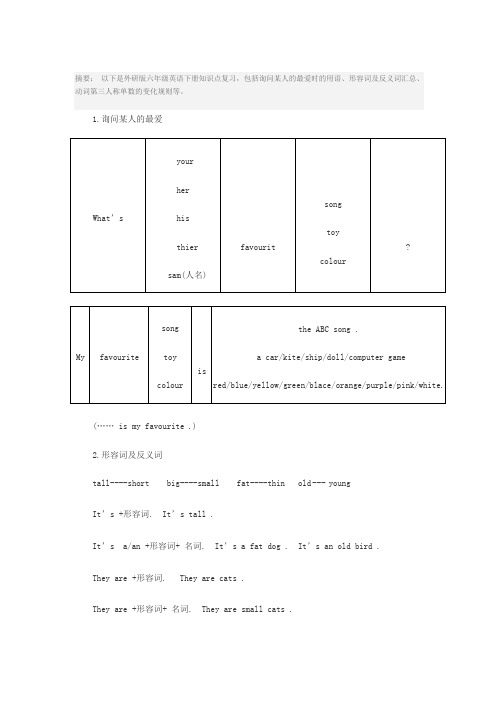
摘要:以下是外研版六年级英语下册知识点复习,包括询问某人的最爱时的用语、形容词及反义词汇总、动词第三人称单数的变化规则等。
1.询问某人的最爱(…… is my favourite .)2.形容词及反义词tall----short big----small fat----thin old --- youngIt’s +形容词. It’s tall .It’s a/an +形容词+ 名词. It’s a fat dog .It’s an old bird .They are +形容词. They are cats .They are +形容词+ 名词. They are small cats .3.动词第三人称单数的变化规则(1)一般情况下在动词词尾加—Splays, sleeps, gets, walks,sings,eats(2)以辅音字母+不发音的e 结尾的动词加S .likes gives(3)以辅音字母+y 结尾的动词,变y 为I + es .study---- studies fly ---- flies(4)以s,x,sh,ch 结尾的动词且发/ s / / z / / t∫//∫/ / d3 /这些音时加es watch - watches(5)以辅音字母+ o 结尾的词加es .go ----- goes do --- does(6)不规则的动词have --- has4.表达喜好5.询问喜好外研版六年级英语下册知识点复习(三)浏览量:1162摘要:以下是外研版六年级英语下册知识点复习,包括 in、on 等方位介词的用法,交通的表达方式,四季天气的表达,have 的用法等。
1、谈论四季(1)It’s spring . It’s warm in spring . What do you do in spring ? We fly kites in spring .It’s green .(2)It’s warm today ,but it’s raining .It’s spring .It’s hot and suuny today .It’s summer .2、表达“有”摘要:以下是外研版六年级英语下册知识点复习,包括 in、on 等方位介词的用法,交通的表达方式,四季天气的表达,have 的用法等。
- 1、下载文档前请自行甄别文档内容的完整性,平台不提供额外的编辑、内容补充、找答案等附加服务。
- 2、"仅部分预览"的文档,不可在线预览部分如存在完整性等问题,可反馈申请退款(可完整预览的文档不适用该条件!)。
- 3、如文档侵犯您的权益,请联系客服反馈,我们会尽快为您处理(人工客服工作时间:9:00-18:30)。
新外研版六年级下册英语知识点归纳Module 1一、单词短语:h amburger 汉堡包 cola 可乐 juice 果汁 dollar 美元 cent 美分 restaurant 餐厅 menu 菜单 cashier 收银员 careful 小心的 Be careful 小心点 look 看上去 enjoy 享受,享用二、句子句型:1.Can I help you? (店员)我能帮助你吗?2.Can you help me?(客人)你能帮助我吗?3.I (don’t) know. 我(不)知道。
4. Here’s (单数) Here’re (复数) 给你… Here you are .给你5. — How much is it?这个多少钱?(一般疑问句) — It’s 数字dollar(s)./ It’s 数字cent(s) 几美元/几美。
6. — What do you want (to eat / drink) ?你想要(吃点/喝点)什么? I want …… 7.Enjoy your meal! 享受你的大餐吧!8.in all 一共,总共三、单词复习:chicken鸡肉 rice 米饭 drink 喝的,饮料 noodles 面条 meat 肉 vegetable 蔬菜 tea茶叶 hot dog 热狗 cheese 奶酪 milk牛奶 fish 鱼,鱼肉Module 2一、单词短语duck 鸭子 pond 水池 cloud 云 picnic 野餐,野炊dry 干的dark 黑的,暗的to go剩余naughty 调皮的;顽劣的stay 保持,维持later 后来,以后like 想......一样look like 看起来好像 have a picnic 去野餐,吃野餐 walk around the lake 绕湖而行 go under the tree 去树下面 Let’s + V 原型,让我们...... go to the park 去公园 go to bed 去睡觉 play chess 下象棋look at 看 at + 点钟在几点钟二、句子句型:1.What time is it?几点了? It’s 整点:数字 o’clock (几点整) half past + 数字(几点半)2.going to rain/snow/be windy/······将要下雨/下雪/刮风△将来时:3. be going to = will 计划和将要发生事be: am are is我是am 你是are, is 连着他她它,两个以上都用are例如:.问:When are we going to go eat(动原)? 我们什么时候去吃东西?答:We are going to eat at half past twelve. 我们将在十二点半吃。
问:what are you going to +动词原形,你将要去干什么?答:I am going to ······三、单词复习:breakfast 早lunch 午餐 dinner 晚餐 hungry饥饿的 sandwich 三明治weather 天气 sunny阳光灿烂的 cloudy 多云的;阴天的 snow雪;下雪 rain雨;下雨 windy多风的 cold 冷的warm 温暖的 hot热的 cool凉爽的 Monday Thursday WednesdayThursday Friday Saturday Sunday Weekend,yesterday todaytomorrow morning noon afternoonevening night tonightModule 3一、单词短语cow 奶牛 rabbit 兔子 supermarket 超市 everyone 人人,每人;大家blow 吹,刮shine (太阳)发光,照耀 blow 吹,刮 cry 哭 dance 跳舞 fly 飞 fly away 飞走brightly 明亮地,耀眼地 sadly 伤心地 strange 奇怪的 middle 中间的 wrong 错误的 just 就,且请 fly a kite 放风筝 buy food 买吃的,买食物 play football 踢足球 lots of = a lot of 许多 take photos 照相 go home 回家in / on the tree 在树上 be angry with 对····生气 a funny day 有趣的一天 make snowman 堆雪人 middle of the night 半夜 in the sky 在空中spoil my fun 坏了我的兴致二、句子句型:1. on + 星期,在星期几2. Please write to me soon. 请尽快给我写信。
3. There is / are / was / were 有4. start to 动原,开始做某事5. 主语 + be + 动词ing 现在进行时公式例如:The sun is shining 阳光灿烂I’m watching TV 我在看电视现在分词变化规则1.动词后+ing;2.动词以不发音的e结尾,去掉e+ing; make-making take-takingride-riding come-coming have-having dance-dancing6.We are having a lovely time! 我们正过着美好的时光。
三、单词复习:Drink 喝,喝水 sing唱,唱歌 swim游泳 hide-and-seek躲猫猫train 火车 jump跳 window 窗户Module 4一、单词短语balloon 气球 stairs (常复)楼梯 mess 肮脏;凌乱 break 烂了,坏了carry 拿,携带,搬运 fall 掉下,落下 fall down 掉下 look at看fall down 跌落 fly away飞走 run away跑开 go away走开come out出来come in进来pick up the apples 捡起苹果walk to the blackboard 走向黑板be careful 小心 at / in the supermarket 在超市a birthday party 生日派对make a birthday card 做生日贺卡二、句子句型1. What a mess. 真是一团糟!2. try to + 动词原形试图......3. —— Who can help me? 谁能帮帮我? I can help you. 我能帮助你。
/Sorry, I can’t.4. 情态动词can,表示能够干什么肯定句:主语+can+动词原型+其它。
I can carry this bag.我能拿这个包否定句:主语+can’t+动词原型+其它。
I can’t carry this bag.我不能拿这个包。
一般疑问句:Can+主语+动词原型+其它?Can you help me ?你能帮助我吗?肯定回答:Yes ,I can .否定回答:sorry, I can’t.三、单词复习alone独自的,单独的 drive 开车 another 另一,又一 stand up起立 sit down坐下Module 5一.单词短语:play 演奏,弹奏(音乐) bark (狗)吠,叫 laugh 大笑,哈哈笑 third 第三(个)time 次,回 nothing 没有东西,没有事情 loudly 大声地 exercise 锻炼,训练do exercise做运动 play the trumpet 吹小号 play the suona 吹唢呐play chess 下象棋 ride a bike骑自行车 but then 但是在那时 try again 再试一次 say to 和······说 eat dinner 吃晚餐 talk to+人和......聊天二、句子句型1. start to + 动词原形开始.......2. 描述当某人正在做某事时,同时又发生什么事。
主语+be+动词ing例:Daming is playing the trumpet but the phone is ringing .大明正在吹小号时电话响起了3. 用进行时谈论或描述正在发生的事情 I’m flying in the sky.我正在天空飞I’m looking out of the window.我正看向窗外三、单词复习phone手机 bell铃,钟 homework 家庭作业 time 时间,次数 hear听,听见wait 等待 stop停止 ring响,响铃 cross 穿过,横穿 watch TV看电视have a birthday party开生日派对 read a book看书 have lunch吃午饭walk in the park公园散步Module 6:谈论过去发生的事情。
(过去式)一、单词短语home 回家 welcome home欢迎回家finish完成decide 决定got (get的过去式) 得到,收到brought (bring的过去式) 拿来,带来bring back带回learnt (learn 的过去式)学习fly -- flew飞 become -- became变成 spend -- spent度过 see -- saw看make --made制作buy-bought give-gave send-sent seed种子model模型present = gift 礼物 Russia俄罗斯 taikonaut (中国的)太空人,宇航员space 太空 spaceship宇宙飞船 space travel太空旅行 interested感兴趣的be interested in 对......感兴趣 national 国家的,民族的 paper 纸做的,纸质的first 最初(的),第一次(的) thank sb for sth 感谢某人的某物give sb sth= give sth to sb给某人某物 send sb into sp 把某人送到某地make sb sth=make sth for sb 为某人制作...... a model of 一个··的模型the name of ···的名字 spaceship 宇宙飞船二、句子句型1. 动作发生在过去要用过去式。
